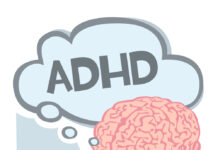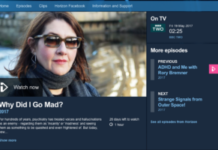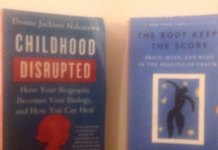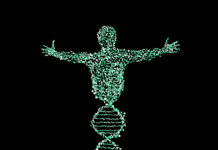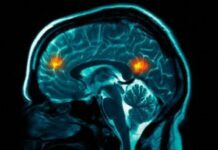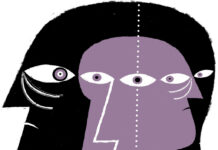Beyond the Hysteria, What “13 Reasons Why” Gets Right
From Medium: "13 Reasons Why," the most-watched series in Netflix history, raises many important real-life concerns that need to be addressed, such as the impact...
Lancet Psychiatry’s Controversial ADHD Study: Errors, Criticism, and Responses
Amid calls for a retraction, Lancet Psychiatry publishes articles criticizing the original finding and a response from the authors.
Racism Linked to Poor Health Outcomes in Children
New study finds children who have been exposed to discrimination show higher likelihood of anxiety, depression, and ADHD.
The Moment the Narrative Changed?
From The British Psychological Society: BBC Horizon's recent documentary "Why Did I Go Mad?" has been monumental in changing the biomedical paradigm of mental illness....
Food Insecurity Linked to Mental Health Globally
Global analysis of 149 countries finds food insecurity is associated with poorer mental health.
Four-Part Series on Drug Abuse, Trauma, and How to Heal It
In this four-part series on drug abuse and trauma, Parents Opposed to Pot provides an overview of the impact of adverse childhood experiences, how they persist, and...
Mental Health Awareness Month: Seven Things to be Aware of
In this piece for Truthout, Noel Hunter lists seven facts it is important to be cognizant of during Mental Health Awareness Month, from the influence...
Childhood Adversity May Increase Risk of Suicide
Swedish study suggests experiencing adversity in childhood is linked to dying by suicide as an adolescent or young adult.
13 Reasons to Watch 13 Reasons Why
From Acting NT: Many mental health advocates have objected to the Netflix series 13 Reasons Why, which centers around the suicide of a teenage girl. Here...
What Lurks Beneath
In this piece for Aeon, Antonio Melechi explores various historical and contemporary perspectives on the nature and purpose of the unconscious mind.
Does Depression run in Families?
From U.S. News: A variety of research shows that children of parents diagnosed with depression are more likely to experience depression themselves. However, it is...
Can a Difficult Childhood Enhance Cognition?
From The Atlantic: Over the past few decades, numerous studies have documented the negative impacts of childhood adversity, indicating a correlation between growing up in an unstable...
Against the Biomedical Model of Mental Illness
From Invisible Illness: The biomedical model of mental illness is a reductionist paradigm that focuses excessively on locating biomarkers and neural correlates of emotional distress at...
How to Better Understand Your Child
From Greater Good: According to pediatrician Claudia Gould, parents and professionals can better understand children's behavior by paying attention to the meaning behind it.
"In a...
Why Everyone Should Watch 13 Reasons Why
From Mindbodygreen: The new Netflix series 13 Reasons Why portrays poignant and important truths about the causes of teen suicide, including the prevalence of bullying and...
Researchers Question Link Between Genetics and Depression
A new study, published in the journal Molecular Psychiatry, found no link between genetics and the occurrence of depressive symptoms.
Is Mental Illness Real?
From The Guardian: Conceptualizing emotional distress or suffering as the result of a biological, genetic illness may be stigmatizing and inaccurate, and may lead to...
Physical Activity Predicts Fewer Symptoms of Depression in Children
An article published in Pediatrics is the first to examine the relationship between physical activity and depression in middle childhood (years 6 to 10) longitudinally.
Study Shows Link Between Food Insecurity and Mental Health
From Medical Xpress: A recent study conducted in the northwestern region of Ghana, Africa shows elevated levels of mental distress among heads of households in...
Depression: Let’s Talk About how we Address Mental Health
From the Office of the United Nations High Commissioner for Human Rights: United Nations Special Rapporteur Dainius Pūras calls for our global community to rethink...
Researchers Make a Case for a “Theory of Nothing” in Psychology
What meaning do psychological constructs really hold, and how are they operationalized and statistically modeled within psychology research?
United Nations Statement Criticizes Medicalization of Depression on World Health Day
"There is a need of a shift in investments in mental health, from focusing on 'chemical imbalances' to focusing on 'power imbalances' and inequalities"
Good Relationships are all in the Family
From Scientific American: A decades-long study recently found that men raised in warmer, more nurturing family environments have stronger relationships in adulthood.
Article →
10 Life Lessons I Learned as a Psychiatric Nurse and Patient
In this piece for Wake Up World, Cortland Pfeffer shares 10 life lessons he learned from his experience as a psychiatric patient, a recovering...
Study Connects Environmental Risk Factors and Psychosis
A meta-analysis of known risk factors for psychosis finds elevated risk with the presence of childhood trauma, adverse life events, and affective dysfunction.


